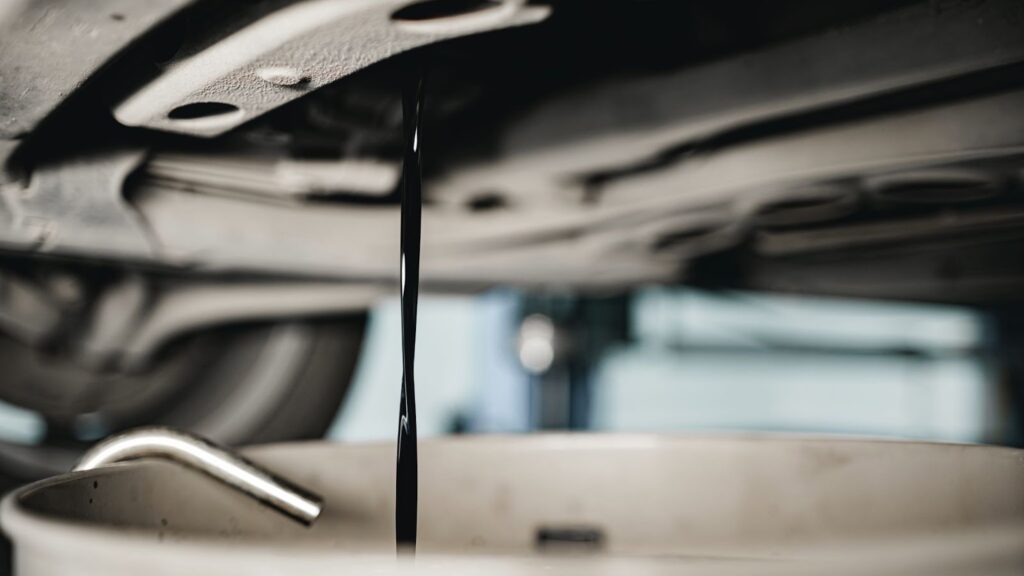A car leaking oil is a common problem that can lead to severe engine issues if left unaddressed. Understanding the causes and solutions can save you time and money. This blog will explore everything from why your car leaks oil to how an auto repair shop can help fix and prevent it.
Regular maintenance, such as an oil and filter change, plays a crucial role in addressing oil leaks and ensuring your engine stays in top condition.
Common Oil Leaks
1. Oil Gasket Leak
One of the most common reasons for oil leaking from a car is worn-out seals and gaskets. These components are designed to prevent oil from escaping the engine. Over time, however, the heat and pressure inside the engine can cause seals and gaskets to degrade. If you notice oil dripping from the car or puddles under it when parked, it might be time to inspect these parts. Ignoring this issue can lead to more severe problems like oil starvation and engine damage.
2. Overfilling Engine Oil
Adding too much oil to your car can lead to excessive pressure inside the engine. This pressure may cause oil to force its way out through seals, gaskets, or vents. To prevent this, always check the oil level using the dipstick after an oil change or refill. If you’re unsure how to get oil out from a car overfill, it’s a straightforward process—drain the excess oil carefully using the oil drain plug or consult a mechanic to avoid damage.
3. Faulty Oil Filter
A faulty or improperly installed oil filter can be a significant cause of oil leaks. If the filter isn’t tightened correctly or if it’s damaged, oil can seep out during engine operation. To prevent oil leaking from the car due to this issue, always replace the oil filter during an oil change and ensure it is securely fitted.
4. Wear and Tear
As engines age, their internal components may wear down, causing cracks or gaps where oil can escape. This wear is especially common in high-mileage vehicles. If you notice oil leaking from your car when parked, it could be due to these natural signs of aging. Regular maintenance and inspections can help mitigate these risks.
5. Oil Drain Plug leaking
A loose or improperly tightened drain plug can cause oil to leak from your car. This issue often arises after an oil change if the plug isn’t secured correctly. Double-checking the tightness of the drain plug during every oil change is a simple but effective way to prevent leaks.
6. Oil Pan leak
The oil pan, located at the bottom of your engine, can be damaged by road debris or rough driving conditions. A cracked or punctured oil pan will lead to leaks. Inspect your oil pan periodically for visible damage and repair or replace it as needed.
Symptoms of Oil Leaks
1. Oil Puddles Underneath Your Car
The most apparent symptom of an oil leak is finding puddles of oil on the ground beneath your car. The color of the oil can vary from golden brown to dark black, depending on its age. Regularly check for these puddles, especially after parking for extended periods.
2. Burning Oil Smell
If oil leaks onto hot engine components like the exhaust manifold, you’ll likely notice a strong burning smell. This is a warning sign that shouldn’t be ignored, as it could also pose a fire risk.
3. Oil Pressure Warning Light
An illuminated oil light on the car dashboard indicates low oil levels. This could be due to a leak or other issues like high oil consumption. Always address this warning immediately to prevent further damage to your engine.
4. Vehicle Shaking While Driving
If your car starts shaking while driving with low oil, it’s a sign that the engine is not receiving adequate lubrication. This condition can cause severe damage to engine components and should be resolved as soon as possible.
How to Fix an Oil Leak
1. Identify the Source
The first step in fixing an oil leak is identifying its source. Common areas to inspect include the oil pan, valve covers, oil filter, and gaskets. A professional mechanic can perform a dye test to pinpoint the exact location of the leak if it’s not immediately visible.
2. Drain Overfilled Oil
If your oil levels are too high, use the oil drain plug to remove the excess carefully. This will prevent additional pressure from building up in the engine and forcing oil out through seals or vents. Knowing how to let out oil from a car overfill is a valuable skill for any car owner.
3. Replace Worn Parts
If the leak is due to worn or damaged components like gaskets, seals, or filters, replace them promptly. Ignoring these issues can lead to significant engine damage and costly repairs down the line.
Preventive Measures
1. Regular Oil Changes
Regular oil changes are vital for maintaining your car’s health. Using the correct type of oil for your vehicle ensures optimal performance and longevity. If you’re wondering, “What oil does my car use?” check your owner’s manual or consult a professional.
2. Check for Leaks Frequently
Routine inspections can help you detect oil leaks early. Check for oil puddles, inspect seals and gaskets, and monitor your oil levels regularly to avoid surprises.
3. Store Oil Properly
Many car owners ask, “Does car oil expire?” While motor oil itself doesn’t expire, its additives can degrade over time, reducing its effectiveness. Always store oil in a cool, dry place and avoid using oil that’s been sitting unused for years.
When to Seek Professional Help
If your car is losing oil but shows no visible leak or smoke, internal engine issues like worn piston rings or valve seals may be to blame. These problems require professional diagnosis and repair at an auto repair shop to prevent further damage. Additionally, if your car’s oil light remains on after topping off, it’s best to consult a mechanic at an auto repair shop immediately.
Dealing with an oil leak can be frustrating, but you don’t have to face it alone. At Eric’s Car Care, our team of experienced mechanics can diagnose and repair your car efficiently. Whether you need an oil change, gasket replacement, or expert advice, we’re here to help. Visit us today and drive with confidence! Book your appointment today at 713-667-9293.

